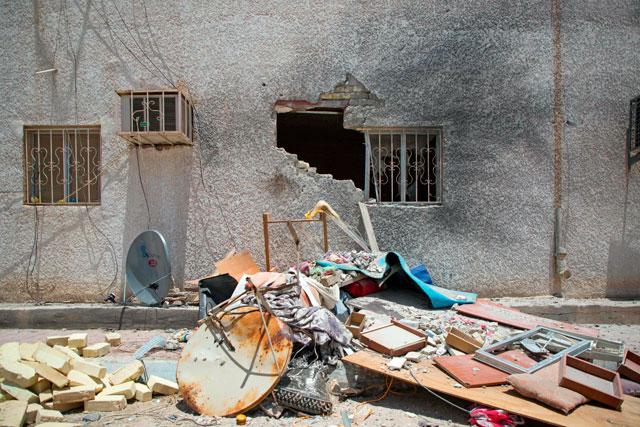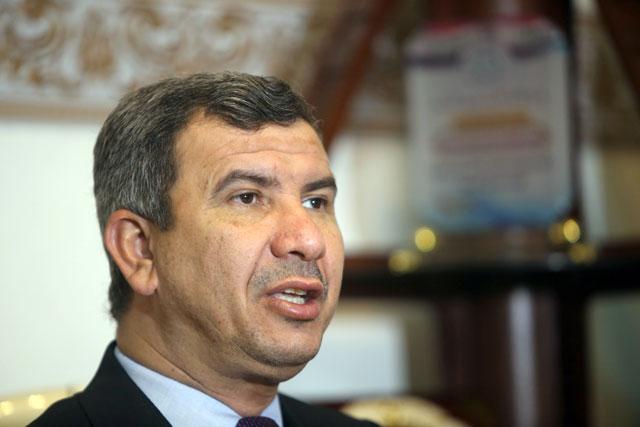You are here
Staff evacuated as rocket strikes near foreign oil firms in Iraq
By Reuters - Jun 20,2019 - Last updated at Jun 20,2019

Damage is seen at a drilling facility that was hit by a Katyusha rocket in the Burjesiya area, a key oil-producing region hosting various Iraqi and foreign companies including US major ExxonMobil, north of the Iraqi city of Basra, on Wednesday (AFP photo)
BASRA, Iraq — A rocket hit a site in southern Iraq used by foreign oil companies on Wednesday, including US energy giant ExxonMobil, wounding three people and threatening to further escalate US-Iran tensions in the region.
There was no immediate claim of responsibility for the attack near Iraq’s southern city of Basra, the fourth time in a week that rockets have struck near US installations.
Three previous attacks on or near military bases housing US forces near Baghdad and Mosul caused no casualties or major damage. None of those incidents were claimed.
An Iraqi security source said it appeared that Iran-backed groups in southern Iraq were behind the Basra incident.
“According to our sources, the team [that launched the rocket] is made up of more than one group and were well trained in missile launching,” the security source said.
He said they had received a tip-off several days ago the US consulate in Basra might be targeted but were taken by surprise when the rocket hit the oil site.
Abbas Maher, mayor of the nearby town of Zubair, said he believed Iran-backed groups had specifically targeted Exxon to “send a message” to the United States.
US-Iranian hostility has risen since President Donald Trump withdrew Washington from a 2015 nuclear deal with Iran and other world powers in May last year.
Trump has since reimposed and extended US sanctions on Iran, forcing states to boycott Iranian oil or face sanctions of their own. Tehran has threatened to abandon the nuclear pact unless other signatories act to rein in the United States.
The US face-off with Iran reached a new pitch following attacks on oil tankers in the Gulf in May and June that Washington blames on Tehran. Iran denies any involvement.
While the long-time foes say they do not want war, the United States has reinforced its military presence in the region and analysts say violence could nonetheless escalate.
Some Western officials have said the recent attacks appear designed to show Iran could sow chaos if it wanted.
Iraqi officials fear their country, where powerful Iran-backed Shiite Muslim militias operate in close proximity to some 5,200 US troops, could become an arena for escalation.
The United States has pressed Iraq’s government to rein in Iran-backed paramilitary groups, a tall order for a Cabinet that suffers from its own political divisions.
Iraq’s military said three people were wounded in Wednesday’s strike by a short-range Katyusha missile. It struck the Burjesia site, west of Basra, which is near the Zubair Oilfield operated Italy’s Eni SpA.
Police said the rocket landed 100 metres from the part of the site used as a residence and operations centre by Exxon. Some 21 Exxon staff were evacuated by plane to Dubai, a security source said.
Zubair mayor Maher said the rocket was fired from farmland around three to 4 kilometres from the site. A second rocket landed to the northwest of Burjesia, near a site of oil services company Oilserv, but did not explode, he said.
“We cannot separate this from regional developments, meaning the US-Iranian conflict,” Maher said.
“These incidents have political objectives... it seems some sides did not like the return of Exxon staff.”
Exports unaffected
Exxon had evacuated its staff from Basra after a partial US Baghdad embassy evacuation in May and staff had just begun to return.
Burjesia is also used as a headquarters by Royal Dutch Shell Plc. and Eni., according to Iraqi oil officials.
The officials said operations including exports from southern Iraq were not affected.
A separate Iraqi oil official, who oversees foreign operations in the south, said the other foreign firms had no plans to evacuate and would operate as normal.
A Shell spokesman said its employees had “not been subject to the attack... and we continue normal operations in Iraq”.
Wednesday’s rocket strike fits into a pattern of attacks since May, when four tankers in the Gulf and two Saudi oil pumping stations were attacked.
They have been accompanied by a spate of incidents inside Shiite-dominated Iraq, which is allied both to the United States and fellow Shiite Muslim Iran.
The attacks in Iraq have caused less damage but have all taken place near US military, diplomatic or civilian installations, raising suspicions they were part of a campaign.
A rocket landed near the US embassy in Baghdad last month causing no damage or casualties. The United States had already evacuated hundreds of diplomatic staff from the embassy, citing unspecified threats from Iran.
Iran backs a number of Iraqi Shiite militias which have grown more powerful after helping defeat Daesh.
Iraqi officials say that threats from Iran cited by Washington when it sent additional forces to the Middle East last month included the positioning by Iran-backed militias of rockets near US forces.
Rockets hit on or near three separate military bases housing US forces near Baghdad and in the northern city of Mosul in three separate attacks since Friday.
Related Articles
TIKRIT, Iraq — Iraqi and US military spokesmen denied on Saturday US forces were preparing to evacuate hundreds of staff of Lockheed Martin
BASRA, Iraq/DUBAI — Exxon Mobil has evacuated all of its foreign staff from Iraq’s West Qurna One oilfield and is flying them out to Dubai,
BASRA, Iraq — Iraqi police opened fire to disperse dozens of protesters near the southern oil hub of Basra on Sunday as they demonstrated ag












